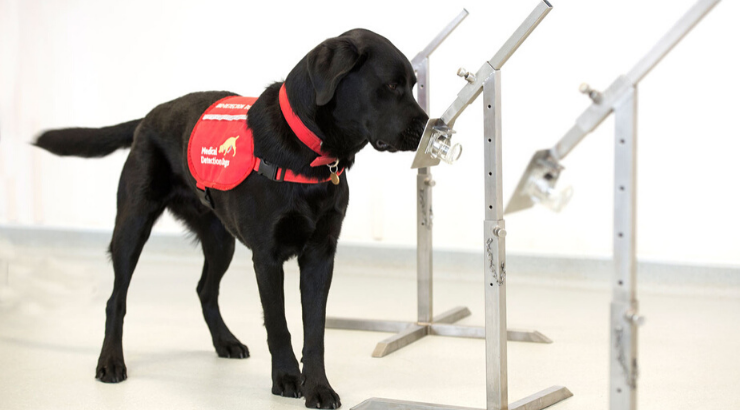Mankind’s Best Friend: Dogs Being Trained To Detect COVID-19 Odors Could Test 750 People Per Hour
Authored by Elias Marat via TheMindUnleashed.com,
There’s plenty of reason why dogs have historically been considered man’s best friend. For at least the past 15,000 years, dogs have served human societies in myriad ways. Whether by hunting pray, helping to herd sheep and cattle, or simply providing us with unconditional love, they have proved themselves to be indispensable companions.
In modern times, dogs have also provided crucial help sniffing out pests such as bedbugs, narcotics, trapped humans or broken gas mains after earthquakes, improvised explosive devices in war zones, and even ailments such as migraine headaches, malaria Parkinson’s disease, and cancer. After all, with some 200 to 300 million sense receptors in dogs’ noses—versus 5 million in human noses—our trusty canine comrades have olfactory abilities that can sense odors we have no ability to perceive.
And now, an ambitious project hopes to wield dogs’ uncanny sense of smell to train them to detect CoViD-19, the infectious disease caused by the novel coronavirus SARS-COV-2.
British charity Medical Detection Dogs has partnered with the London School of Hygiene and Tropical Medicine (LSHTM) and Durham University to begin efforts to train their elite sniffing dogs for the task. According to behavioral psychologist Dr. Claire Guest, CEO of Medical Detection Dogs, there is no reason to doubt that the canines are up to the task.
***CV-19 SUPER SIX***
Norman, Digby, Storm, Star, Jasper and Asher could be trained to detect if someone has #COVID19 and play a vital role in preventing further spread of the pandemic in future. @LSHTM@durham_unihttps://t.co/xuheY7OOz6 pic.twitter.com/vOdTuekdaW
— Medical Detection Dogs (@MedDetectDogs) April 18, 2020
Guest told CTV News:
“We already train dogs in the past… [there is] absolutely no reason why a dog can’t detect the virus.”
And it’s not just a matter of confidence—it’s also an approach that is rooted in the rigorous science of over a dozen peer-reviewed papers that Medical Detection Dogs has produced in the course of training dogs to detect serious illnesses.
Head of the disease control department at LSHTM Prof. James Logan explained:
“Our previous work demonstrated that dogs can detect odors from humans with a malaria infection with extremely high accuracy – above the World Health Organization standards for a diagnostic.”
After six weeks of intensive training we could see a brigade of dogs who are capable of providing a speedy and non-invasive diagnosis at the tail end of the pandemic. The dogs would undergo some of the same training they received to detect bacterial infections, prostate cancer, and Parkinson’s—mainly through sniffing samples, indicating when they found it, and being able to detect the subtle changes in skin temperature indicating a fever, according to a statement from the group.
Logan cautioned that it still remains early for detecting any specific odor belonging to CoViD-19. However, because other respiratory diseases cause body odor changes, it is quite likely that CoViD-19 does as well, which means that dogs would definitely be able to detect it. Such a new diagnostic tool has the potential to provide a revolutionary new method to help curb the pandemic.
On the Medical Detection Dogs website, Guest wrote:
“The aim is that dogs will be able to screen anyone, including those who are asymptomatic and tell us whether they need to be tested. This would be fast, effective and non-invasive and make sure the limited NHS testing resources are only used where they are really needed.
We know that other respiratory diseases like COVID-19, change our body odor so there is a very high chance that dogs will be able to detect it. This new diagnostic tool could revolutionize our response to COVID-19 in the short term, but particularly in the months to come, and could be profoundly impactful.”
Professor Steve Lindsay at Durham University says:
“If the research is successful, we could use COVID-19 detection dogs at airports at the end of the epidemic to rapidly identify people carrying the virus. This would help prevent the re-emergence of the disease after we have brought the present epidemic under control.”
Tyler Durden
Wed, 04/22/2020 – 21:20
